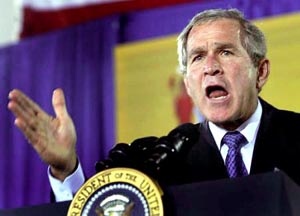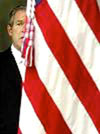Like Father Like Son: George H. W. Bushs 1991 Game-Plan to Destroy Iraq
October 3, 2002

Since it was founded in 1992, the International Action Center has led campaigns against the Pentagons wars and US sanctions against Iraq, Cuba, and Yugoslavia. The IAC had its roots in the work of Former US Attorney Ramsey Clark who, in 1991, organized an independent global grassroots tribunal to investigate charges that the US military had committed war crimes during the Persian Gulf War.
Eleven years after President George H. W. Bush attacked Saddam Husseins Iraq, it is a chilling experience to review the findings of Clarks International War Crimes Tribunal
The revelations unearthed by Clarks Tribunal cast a foreboding sense of déjà vu over current events. It becomes apparent that a very bloody and duplicitous chapter of US history is in the process of repeating itself.
The same Iraq game plan that was crafted for President George Herbert Walker Bush by Dick Cheney, Donald Rumsfeld and Colin Powell is now being followed, step-by-step, by Bushs son, George W. Bush.
The War Crimes Tribunal not only concluded that George H. W. Bush had committed crimes against humanity, it also established that Mr. Bushs subversion and violation of US domestic laws constituted clear grounds for impeachment under the Constitutions definition of high crimes and misdemeanors.
Consider these highlights from Ramsey Clarks 1991 report:

Like his father before him, George W. Bush, facing economic disaster at home, now threatens war in the name of patriotism. |
President Bush from August 2, 1990, intended and acted to prevent any interference with his plan to destroy Iraq economically and militarily.
Without consultation or communication with Congress, President Bush ordered 40,000 US military personnel to advance the US buildup in Saudi Arabia in the first week of August 1990. On August 8, 1990, Bush assured the world his acts were "wholly defensive." He waited until after the November 1990 elections to announce his earlier order sending more than 200,000 additional military personnel (clearly an assault force), again without advising Congress. As late as January 9, 1991, he insisted he had the constitutional authority to attack Iraq without Congressional approval.
While concealing his intention, President Bush continued the military build-up of US forces unabated from August into January 1991, intending to attack and destroy Iraq. When Air Force Chief of Staff General Michael J. Dugan mentioned plans to destroy the Iraqi civilian economy to the press on September 16, 1990, he was removed from office.
President Bush caused the United Nations to bypass Chapter VI of the UN Charter for the Pacific Settlement of Disputes. President Bush coerced the United Nations Security Council into an unprecedented series of resolutions, finally securing authority for any nation in its absolute discretion by all necessary means to enforce the resolutions.
To secure votes, the US paid multi-billion dollar bribes, offered arms for regional wars, threatened and carried out economic retaliation, forgave multi-billion dollar loans (including a $7 billion loan to Egypt for arms), offered diplomatic relations despite human rights violations, threatened economic and political reprisals, and in other ways corruptly exacted votes, creating the appearance of near universal international approval of US policies toward Iraq.
The US paid the UN $187 million in unpaid dues to avoid criticism of its coercive activities. A country which opposed the US, as Yemen did, lost millions of dollars in aid, as promised, the costliest vote it ever cast. The UN, created to end the scourge of war, became an instrument of war and condoned war crimes.
President Bush consistently rejected and ridiculed Iraq's efforts to negotiate a peaceful resolution, beginning with Iraq's August 12, 1990, proposal, largely ignored, and ending with its mid-February 1991 peace offer which he called a "cruel hoax."
President Bush consistently insisted there would be no negotiation, no compromise, no face saving, no reward for aggression. Simultaneously, he accused Saddam Hussein of rejecting diplomatic solutions.
President Bush led a sophisticated campaign to demonize Saddam Hussein, calling him a Hitler, repeatedly citing reports which he knew were false of the murder of hundreds of incubator babies, accusing Iraq of using chemical weapons on his own people and on the Iranians knowing US intelligence believed the reports untrue.
After subverting every effort for peace, President Bush began the destruction of Iraq. This course of conduct constitutes a crime against peace.
President Bush usurped the Constitutional power of Congress as a means of securing power to commit crimes against peace, war crimes, and other high crimes.
President Bush intentionally usurped Congressional power, ignored its authority, and failed and refused to consult with the Congress. He deliberately misled, deceived, concealed and made false representations to the Congress to prevent its free deliberation and informed exercise of legislature power. President Bush individually ordered a naval blockade against Iraq, itself an act of war. He switched US forces from a wholly defensive position and capability to an offensive capacity for aggression against Iraq without consultation with and contrary to assurances given to the Congress.
The conduct violates the Constitution and laws of the United States, all committed to engage in the other impeachable offenses set forth in this Complaint.
The United States has violated and condoned violations of human rights, civil liberties and the US Bill of Rights in the United States, in Kuwait, Saudi Arabia and elsewhere to achieve its purpose of military domination.
Among the many violations committed or condoned by the US government are the following:- illegal surveillance, arrest, interrogation and harassment of Arab-American, Iraqi-American, and US resident Arabs;
- illegal detention, interrogation and treatment of Iraqi prisoners of war;
- aiding and condoning Kuwaiti summary executions, assaults, torture and illegal detention of Palestinians and other residents in Kuwait after the US occupation; and
- unwarranted, discriminatory, and excessive prosecution and punishment of US military personnel who refused to serve in the Gulf, sought conscientious objector status or protested US policies.
Persons were killed, assaulted, tortured, illegally detained and prosecuted, harassed and humiliated as a result of these policies.
The conduct violates the Charter of the United Nations, the Universal Declaration of Human Rights, the Hague and Geneva Conventions and the Constitution and laws of the United States.
The following document is from the Initial Complaint, filed by Former US Attorney Ramsey Clark in May 1991. An abbreviated list of the charges appears in a companion document. The entire file is available from the International Action Center [39 West 14th St., #206; New York, NY 10011, www.iacenter.org].
War Crimes Tribunal
Initial Complaint, May 9, 1991
Charging
George Bush, J. Danforth Quayle, James Baker, Richard Cheney, William Webster, Colin Powell, Norman Schwarzkopf and Others to be named
With
Crimes Against Peace, War Crimes, Crimes Against Humanity and Other Criminal Acts and High Crimes in Violation of the Charter of the United Nations, International Law, the Constitution of the United States and Laws made in Pursuance Thereof.
Background

Both Bushes share the convenient habit of hiding behind the flag to cloak their evil deeds. |
Since World War I, the United Kingdom, France, and the United States have dominated the Arabian Peninsula and Gulf region and its oil resources. This has been accomplished by military conquest and coercion, economic control and exploitation, and through surrogate governments and their military forces. Thus, from 1953 to 1979 in the post World War II era, control over the region was exercised primarily through US influence and control over the Gulf sheikdoms of Saudi Arabia and through the Shah of Iran.
From 1953 to 1979 the Shah of Iran acted as a Pentagon/CIA surrogate to police the region. After the fall of the Shah and the seizure of US Embassy hostages in Teheran, the US provided military aid and assistance to Iraq, as did the USSR, Saudi Arabia, Kuwait and most of the Emirates, in its war with Iran.
Throughout the 75-year period from Britain's invasion of Iraq early in World War I to the destruction of Iraq in 1991 by US air power, the United States and the United Kingdom demonstrated no concern for democratic values, human rights, social justice, or political and cultural integrity in the region, nor for stopping military aggression there.
The US supported the Shah of Iran for 25 years, selling him more than $20 billion of advanced military equipment between 1972 and 1978 alone. Throughout this period, the Shah and his brutal secret police (called SAVAK) had one of the worst human rights records in the world. Then in the 1980s, the US supported Iraq in its wrongful aggression against Iran, ignoring Iraq's own poor human rights record.
When the Iraqi government nationalized the Iraqi Petroleum Company in 1972, the Nixon Administration embarked on a campaign to destabilize the Iraqi government. It was in the 1970s that the US first armed and then abandoned the Kurdish people, costing tens of thousands of Kurdish lives.
The US with close oil and other economic ties to Saudi Arabia and Kuwait has fully supported both governments despite the total absence of democratic institutions, their pervasive human rights violations and the infliction of cruel, inhuman and degrading punishments such as stoning to death for adultery and amputation of a hand for property offenses.
The US, sometimes alone among nations, supported Israel when it defied scores of UN resolutions concerning Palestinian rights, when it invaded Lebanon in a war which took tens of thousands of lives, and during its continuing occupation of southern Lebanon, the Golan Heights, the West Bank and Gaza.
The United States itself engaged in recent aggressions in violation of international law by invading Grenada in 1983, bombing Tripoli and Benghazi in Libya in 1986, financing the contra in Nicaragua, UNITA in southern Africa and supporting military dictatorships in Liberia, Chile, El Salvador, Guatemala, the Philippines, and many other places.
The US invasion of Panama in December 1989 involved the same and additional violations of international law that apply to Iraq's invasion of Kuwait. The US invasion took between 1,000 and 4,000 Panamanian lives. The United States government is still covering up the death toll. US aggression caused massive property destruction throughout Panama.
According to US and international human rights organization estimates, Kuwait's casualties from Iraq's invasion and the ensuing months of occupation were in the "hundreds" - between 300 and 600. Reports from Kuwait list 628 Palestinians killed by Kuwaiti death squads since the Sabah royal family regained control over Kuwait.
The United States changed its military plans for protecting its control over oil and other interests in the Arabian Peninsula in the late 1980s when it became clear that economic problems in the USSR were debilitating its military capacity and Soviet forces withdrew from Afghanistan. Thereafter, direct military domination within the region became the US strategy.
For an abbreviated version of the War Crimes Tribunal document listing The Charges attached to the Initial Complaint, see Around the Bend: Part 2.
For more information contact:
Please contact the websites and resources in the above article.







